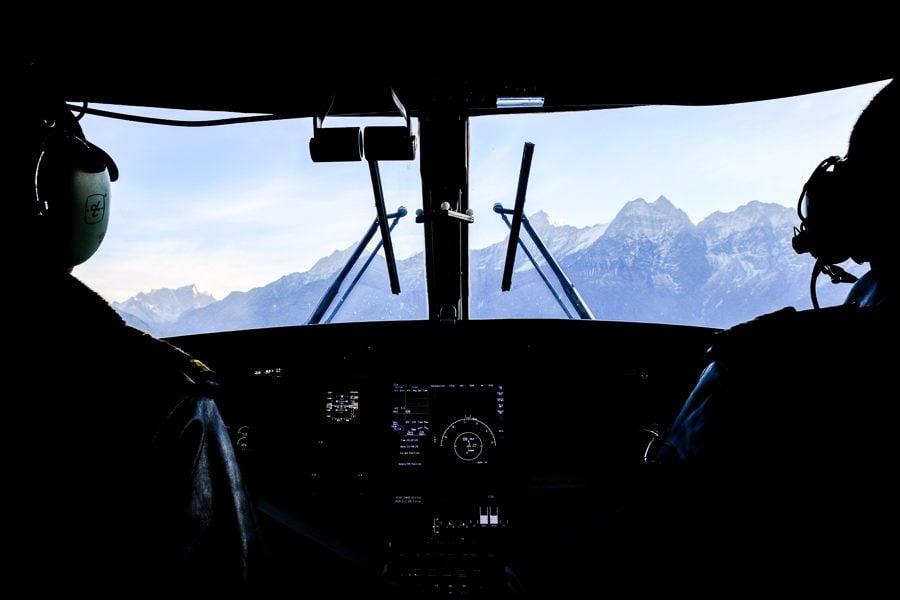Summary
- Starting elevation: 1,400 m (4,600 ft)
- Ending elevation: 2,860 m (9,400 ft)
- Elevation gain: 1,460 m (4,800 ft)
- Distance covered: 140 km (87 mi)
- Time hiked: 0h 0m
Most hikes to Everest Base Camp (and Gokyo Lakes) commence with an exhilarating flight from Kathmandu to Tenzing-Hillary airport in Lukla – frequently referred to as the most dangerous airport in the world. This short and scenic 30-minute flight takes you directly into the mountains, landing on a narrow strip precariously placed on a cliff’s edge. With a 600-meter (2,000-foot) drop at one end and a solid rock wall at the other, there is minimal room for error.
Is it as perilous as people portray? Probably not. However, it certainly incurs its share of anxiety and tension.
The small size of the plane (14-seater) does little to build confidence, especially alongside Nepal’s safety reputation. No sidewalks can be seen, and the driving conditions leave much to be desired!
Nonetheless, this particular airport adheres to robust regulations, which have contributed to a relatively low accident rate over the years.

Mountain flying will inherently pose more hazards than typical flights. Nonetheless, it’s worth noting that this airport operates between 20 to 50 flights daily, depending on the season.
When you analyze the statistics, it translates to tens of thousands of safe flights executed over the last decade — a reassuring figure for travelers.
While I believe the risk is manageable, I admit to feeling quite anxious during both takeoff and landing.
If flying to Lukla still sounds unappealing, hiking there from Jiri remains an option. However, this alternative entails a lengthy bus ride and approximately five additional days of hiking.

Opting to fly to Lukla allowed me to save time and indulge my adventurous spirit in experiencing such a thrilling flight.
The experience did not disappoint! The aerial views were breathtaking. If you’re keen on catching the best mountain views, ensure you sit on the left side of the plane during the flight to Lukla.
Having heard terrifying accounts about the check-in process and the reliability of Lukla flights (which only depart under clear line-of-sight conditions), I was pleasantly surprised when my flight proceeded without incident.
The flight to Lukla departed on time, maintaining a smooth operational flow from start to finish. Factors may vary, particularly during different trekking seasons; nonetheless, opting for the first flight of the day boosts your chances of an on-time departure.
Once you touch down in Lukla, the real adventure is just beginning!

EBC Trek – Day 1
EBC Trek – Day 2 Overview
- Starting elevation: 2,800 m (9,200 ft)
- Ending elevation: 3,440 m (11,300 ft)
- Elevation gain: 640 m (2,100 ft)
- Distance covered: 5 km (3 mi)
- Time hiked: 4h 45m
Day 2 of the EBC Trek presents sights akin to those of Day 1, featuring more suspension bridge crossings, azure rivers, and snow-capped peaks in the background. Many of these bridges are genuinely remarkable, and after traversing a few, they transform from intimidating to exhilarating.
This day also involves more uphill trekking, which can become tiresome as the effects of altitude come into play.
During the night, one trekker in Namche succumbed to altitude sickness, but the majority of us fared relatively well throughout the day.

A notable difference on Day 2 is that you approach the majestic peaks, concluding with a stunning view of Kongde Ri peak looming over Namche Bazaar.
This view is quite spectacular, and fortunately, you get to enjoy it two days in a row.

By the time I reached Namche, I felt slightly lightheaded but overall in good condition.
My accommodation in Namche (Hotel Sherpa Village & Restaurant) was significantly better than the previous lodge (Hotel Waterfall) at Benkar, which greatly enhanced my experience.
In Namche Bazaar, I was pleased to discover numerous restaurants, shops, and places to stay. This larger village serves as the crucial hub for all treks heading to EBC and beyond.
Although the lodges are unheated, they are quite pleasant. I considered myself a happy camper!





